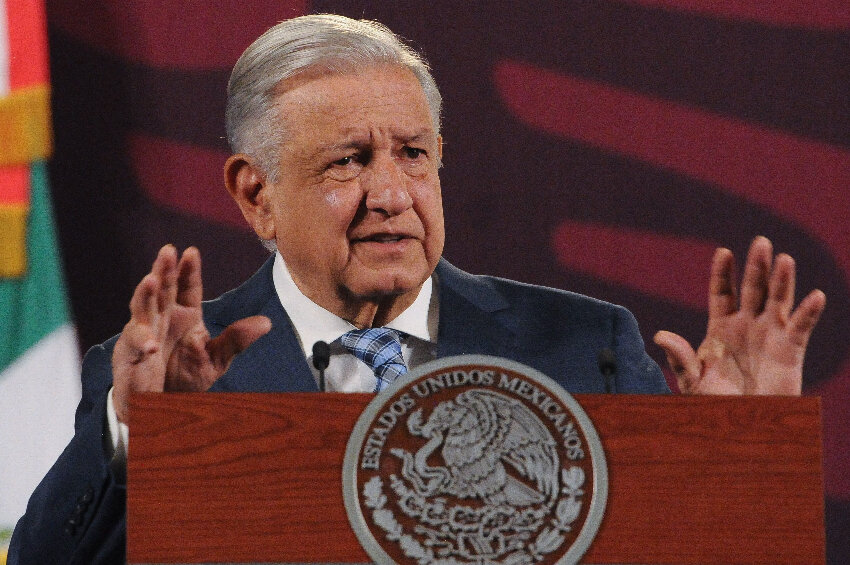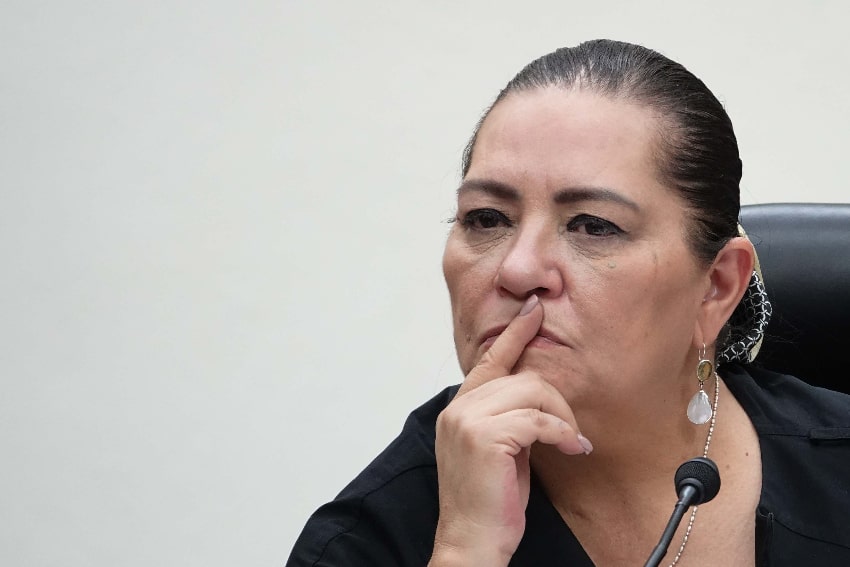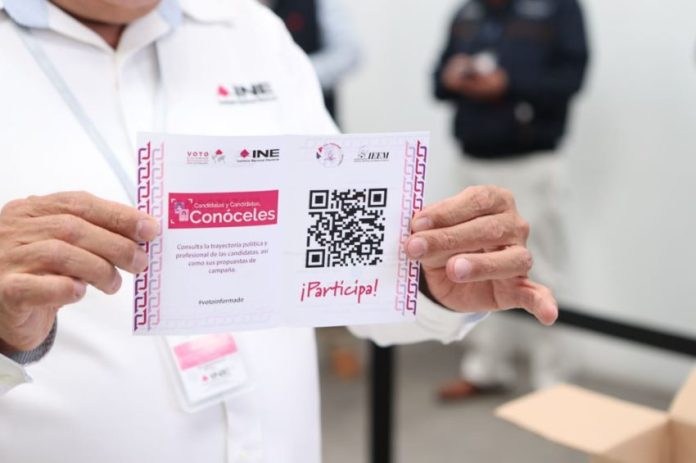President Andrés Manuel López Obrador said Monday that the federal government is working to ensure that Mexicans abroad can vote in the June 2 elections after almost 40,000 citizens were removed from Mexico’s foreign electoral roll due to what the National Electoral Institute (INE) called “irregularities” or “inconsistencies” in their voter registration applications.
After a reporter asserted that the INE committed a “great fraud” in rejecting the applications of more than 39,000 Mexicans, López Obrador acknowledged that there is “discontent among our compatriots who were removed from the [electoral] roll.”
He added that the government is “dealing with the issue with INE to find the way in which they can vote.”
López Obrador said he would ask Foreign Affairs Minister Alicia Bárcena and Interior Minister Luisa María Alcalde to “seek information” and meet with INE President Guadalupe Taddei Zavala and electoral councilors to “look at the issue.”
He was critical of the electoral agency for “always putting obstacles” in the way of migrants that prevent them from participating in elections in Mexico.
“That’s why very few vote,” López Obrador said, adding that Bárcena and Alcalde would provide an update on the situation on Wednesday.

The three candidates vying to become Mexico’s next president — Claudia Sheinbaum, Xóchitl Gálvez and Jorge Álvarez Máynez — all criticized the INE for its removal of tens of thousands of Mexicans abroad from the foreign electoral roll.
The INE advised the almost 40,000 Mexican about the problems with their registrations just over seven weeks before citizens will go to the polls to elect a new president as well as state governors, mayors and thousands of federal, state and municipal officials.
Mexicans abroad advised that their applications to vote were “inadmissible”
A significant number of Mexicans living abroad reported last week that they had received emails from INE advising them that their applications to be registered as overseas voters had been rejected.
Exijo mi derecho a votar desde el extranjero, me registre en tiempo y forma, me indicaron que fue procedente mi registro.. dos meses después me notifican qué es improcedemte… es muestra de ineficacia del INE. espero me den una solución @NTelevisa @julioastillero @SinEmbargoMX pic.twitter.com/LkMtpL3Xjx
— Bell70 (@vaeb7089) April 13, 2024
Recipients of the emails from INE have shared them on social media
Emails received by would-be voters — copies of which were published in news reports and on social media — said that the status of their “individual request” to be included on the foreign electoral roll had been changed to “inadmissible” due to “inconsistencies and/or an invalid registration situation.”
Those emails did not tell individuals what inconsistencies had been detected in their applications, but the INE on Saturday published a statement in which it broadly explained the reasons why the requests to vote from abroad on the internet, by mail or in person were denied.
Many recipients of the emails said that they were previously informed that their applications to vote had been accepted.
Fernanda Morales-Calva, a Mexican woman studying in Texas, is one such person. She said on the X social media platform that she had been informed of her “successful inclusion” on the electoral roll “months ago.”
What were the reasons for the rejection of voter registration applications?
INE said that it carried out a “meticulous revision” of 42,436 voter registration applications and determined that 39,724 — or almost 94% of those reviewed — were inadmissible due to “irregularities” or “inconsistencies” in supporting documents. It highlighted that the number of people whose applications were rejected is equivalent to just 0.04% of the number of citizens on the national electoral roll.
The electoral authority said that the irregularities and inconsistencies it detected in voter registration applications fell into four categories.
- More than 18,000 applications were rejected due to “signature irregularities,” including that the signatures were illegible or didn’t match those on voter IDs.
- Over 12,500 applications were deemed invalid due to “non-compliance” with INE requirements.
- More than 8,000 applications had “multiple irregularities,” such as the inclusion of “fake documents” and “non-existent addresses.”
- Over 800 applications had “irregularities” in documents that were provided as proof of address.
After the revision process, INE said that 187,388 people remained on the foreign electoral roll. In other words, 17.5% — or one in six — of those who were previously on the roll were removed.
Affected Mexicans advised to contact INE
INE said in another statement that Mexicans who were told that their application to vote from abroad was rejected could contact INE to “clarify the situation with their registration.”
The statement said that those affected should call INE on one of the numbers provided or write to a specified email address by May 5 to “make the necessary clarifications and ratify their registration on the foreign electoral roll in the specific method they chose.”

One person left a comment beneath the statement, saying that it was pointless to call INE as “the person” who answers “doesn’t know exactly what happened with your process.”
“They just ask you to fill out a complaint form, send papers to Mexico and see what they respond,” wrote Cecilia Tejeda.
Other Mexicans claimed that there wouldn’t be enough time for INE to re-register all affected voters before the elections are held.
INE: Mexicans excluded from foreign electoral roll can still vote — but not online or by mail
INE said that Mexicans abroad who were advised that their application to vote by their chosen method was deemed invalid could still vote even if they don’t make the “necessary clarifications” to “ratify their registration” on Mexico’s foreign electoral roll.
However, to do so they must vote in person at one of 23 Mexican consulates with a “voting reception module.”
In other words, they can’t vote online or by mail, the other two “methods” Mexicans abroad were given the option of choosing when registering to vote. This is the first federal election in which Mexicans living abroad can vote electronically, although they were able to vote online in state-level elections in 2021 and 2023.
“It’s important to specify that Mexicans whose registration was found to be inadmissible … and who don’t make said clarification … will, with [their voter] ID processed in Mexico or abroad, be able to vote in special booths that will be installed in 23 consular offices,” INE said.
Getting to a voting location may be difficult if not impossible for some Mexicans abroad, especially if they don’t live in the United States.

Twenty of the locations are in the U.S., including in the cities of Los Angeles, New York and Houston, while one is in Montreal, Canada. The other two are in Madrid, Spain, and Paris, France.
The electoral authority also noted that Mexicans who live abroad could vote in Mexico on June 2 as they will still be on the national electoral role. Their ability to cast a ballot in Mexico “guarantees at all times their right to vote,” INE said.
However, returning to Mexico to vote is unlikely to be a viable option for many Mexicans who live abroad.
While the majority of Mexico’s diaspora is in the United States, Mexicans live all over the world, including in scores of countries where they won’t have the option to vote in person.
Many of the almost 40,000 Mexicans whose suffrage was suddenly jeopardized will no doubt be waiting anxiously for the update from the government on Wednesday.
Mexico News Daily
